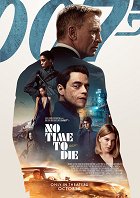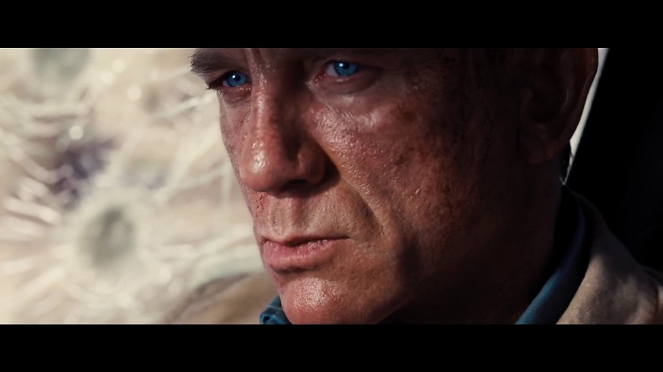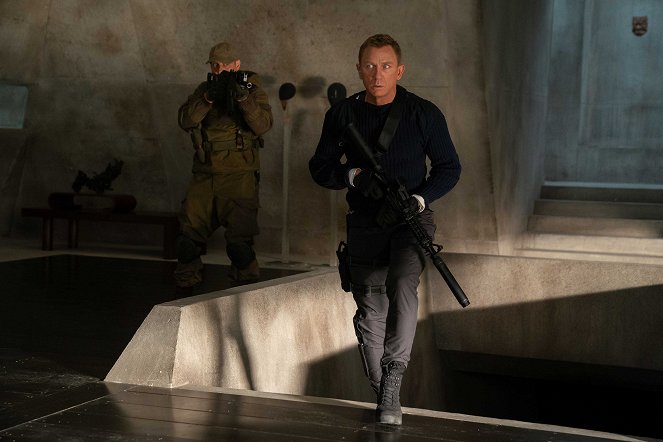Directed by:
Cary Joji FukunagaCinematography:
Linus SandgrenComposer:
Hans ZimmerCast:
Daniel Craig, Léa Seydoux, Rami Malek, Lashana Lynch, Ralph Fiennes, Ben Whishaw, Ana de Armas, Naomie Harris, David Dencik, Rory Kinnear, Jeffrey Wright (more)VOD (4)
Plots(1)
Bond (Daniel Craig) has left active service and is enjoying a tranquil life in Jamaica. His peace is short-lived when his old friend Felix Leiter (Jeffrey Wright) from the CIA turns up asking for help. The mission to rescue a kidnapped scientist turns out to be far more treacherous than expected, leading Bond onto the trail of a mysterious villain armed with dangerous new technology. (Metro-Goldwyn-Mayer (MGM))
(more)Videos (8)
Reviews (17)
This time the Broccoli party played nicely on emotions. And in the role of Bond, Craig tried out the broadest range of inner developments and facial expressions not only of his five appearances in the franchise, but all of the Bond films. As an emotional viewer, I was thoroughly moved. The relationship with Léa Seydoux was nicely deepened. But what about the faulty logic in the main villain’s (Malek) motivation and behavior and the other ill-conceived things? Is it so difficult to polish the screenplay of a much-anticipated, worldwide mega-film also in this respect? A repeat viewing of Spectre the day before was helpful, and No Time to Die follows directly from it. Zimmer is excellent in the suspenseful scenes, particularly in the encounter with Blofeld (Waltz).
()
The days of going to see Bond for the explosions, gadgets and cleavage are definitely over. Daniel Craig has taken Bond to a time when protagonists bleed, feel and have a finite amount of time. No Time to Die beautifully concludes the arc begun by Casino Royale and, despite a chaotic villain, delivers exactly what I expected: a surprisingly intimate and moving finale for the best Bond of all time, Daniel Craig
()
After the screening, I gave it full stars and contentedly enjoyed the reverberations of an experience overflowing with testosterone and adrenaline, only to begin to slightly waver the next day in favor of the "objective findings" that it had a rather futile villain and an often overly determined effort to tighten all the storylines from previous stints. But this is love, pure and sincere. Spectre could have been a full-on epilogue, and thankfully, it’s not. Daniel Craig came for a complex farewell in No Time to Die, brimming with big emotions that jostle for a place in the audience's good graces with an absolutely archetypal old-school Bond film, where the aforementioned villain with totally "full-retard" motivations fills his role to a tee and Q serves up the toys he mocked less than a decade earlier. Fukunaga paces it at an incredible rhythm (where is the much-mentioned mid-film tempo drop?) and keeps everything running in a completely polished and compact whole, where there is no room for peaks and valleys, but rather a thoughtful interplay of emotional outpourings and fantastic action. T. C. may be hanging under a helicopter and my jaw is dropping, but when a sweat and blood-soaked Craig climbs a staircase in one camera take, accompanied by Zimmer's thunderous music, I still know which agent with permission to replace a bulldozer will always be the most popular with me.
()
Bond has never been progressive in the sense of setting trends or coming up with anything new, and the films starring Daniel Craig are no different in that respect. This is most evident in the action sequences, where we find nothing that is particularly ground-breaking or unprecedented (compared to the rival Mission: Impossible franchise). The action in Bond movies adopts and very well applies current trends set by other films – from Casino Royale with its opening sequence referencing the contemporary fashion of parkour films, through the Bourne-esque formalistic chaos of Quantum of Solace, to the staircase one-shot of Atomic Blonde. And the same is true of everything else, including the (social) media hype around having Bond played by a woman. The franchise’s creators are aware of Bond’s contradictory position in the contemporary cultural world, where progressivism, emancipation and representation are more prominent, and they incorporated a reflection of that world into the narrative within and around the film. It is certainly worth mentioning the shift within the franchise, where for the first time there is a complete absence of blatant objectification, as well as the need to question or at least comment on whether female characters can be equally as capable as the male characters (which distinguished the first emancipatory instalment, Tomorrow Never Dies, as well as the Craig-era Skyfall). In contrast to all of the progressive elements in No Time to Die, however, the traditional concepts prevail in the end and the whole film remains disturbingly cautious and conservative at its core. To find a contrast, it suffices to recall how iconic characters and franchises were dealt with in the iconoclastic and truly progressive Mad Max: Fury Road and Blade Runner 2049. In comparison with those films, the makers of No Time to Die not only fail to tone down the fantasies and ideals of Bond and the audience, but rather continue to reinforce them. Though the film likably acknowledges that this world no longer belongs only to men, it still revolves entirely around Bond. In the end, all of the female characters eventually vacate the space without discussion so that the hero can stand out and walk away with a grand show of action and emotion. Bond thus remains a hero built on male myths of exclusivity, predestination and irreplaceability, even though there are various comments around him indicating that the iconic codename no longer belongs to him. But either he confidently shrugs it off by saying it’s “just a number” or others tell him that he is still the only one who deserves it. Despite all of his broadly proclaimed but, in reality, superficial emotional depth, Craig’s Bond remains a boomer character at his core. Though he makes the changing world around him familiar to similar devotees of the old order, he also manifests the dream that they can pass through that world with grace, with their heads held high, and everyone will still shed a tear for them. Unsurprisingly, bidding farewell to one portrayer of Bond is strikingly similar to saying goodbye to the first generation of Marvel films, which also began with the promise of a relatively fresh drive and ended up as teary-eyed dad cinema. It is logical that every franchise evolves with its contemporary audience. In spite of that, I am fascinated by the fact that Craig’s Bond movies have, for many viewers, apparently successfully humanised a character that was originally created as a campily exaggerated caricature, and still remains so at its core. Unfortunately, I have never believed its “emotions” and I found it rather laughable in its fake solemnity. P.S.: The inflated hype around who might be the next 007 is eloquently ridiculed by the trailer for Casino Royale (1967).
()
(less)
(more)
One thing is for sure, in a year we won't be seeing many filmed concerts like this one. A few hours after the premiere, I can still hear the reverberations in me, so I know something is very right here. Sufficiently Bond cool, sufficiently suspenseful, visually spectacular, and surprisingly still full of emotion. Plus, it beautifully delivers on the demands of the times without annoying the viewer.
()



Ads